ENCYCLOPEDIA D - G
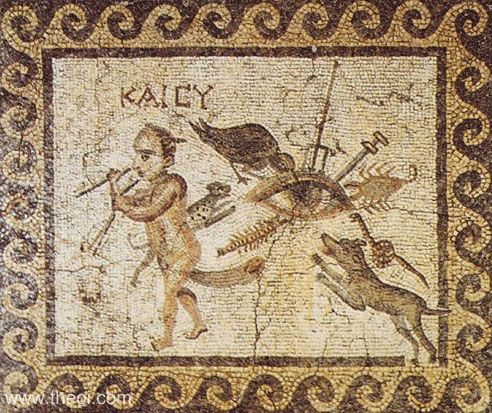
DACTYLS (Daktyloi) Magician-smiths of the Greek island of Crete in the service of the goddess Rhea.
DAEIRA A goddess-nymph of the Eleusinian mysteries.
DAEMONAE (Daimonai) Female daimones or spirits including nymphs and female personifications and abstractions such as Eris (Strife) and Tyche (Luck).
DAEMONES (Daimones) Spirits of the air, earth, sea and underworld. They included personifications such of Elpis (Hope) and Hypnos (Sleep) and nature spirits like the river-gods and nymphs.
DAEMONES, AGATHI (Daimones Agathoi) Good spirits which protected and bestowed blessings upon mankind.
DAEMONES ARGYREAN (Daimones Argyreoi) Men of the silver age who were immortalised as underground spirits responsible for the earth's fertility.
DAEMONES, CACO- (Kakodaimones) Harmful spirits which escaped from the jar of Pandora to forever plague mankind.
DAEMONES CHRYSEAN (Daimones Khryseoi) Men of the golden age who were immortalised as earth-dwelling spirits to watch over and protected mankind.
DAEMONES CHTHONIAN (Daimones Khthonioi) The daemon-spirits of the underworld.
DAEMONES GEORGICI (Daimones Georgikoi) The spirits of agriculture and farming.
DAEMONES HALIAN (Daimones Halioi) The spirits of the sea.
DAEMONES NOMIAN (Daimones Nomioi) The spirits of the countryside, pastureland and wilds.
DAEMONES URANIAN (Daimones Ouranioi) The spirits of the sky.
DAEMONES PROSEOUS (Daimones Proseoos) Evil spirits which haunted the dark, seaside caverns of the island of Rhodes.
DAMASEN A giant who slew a fearsome dragon terrorising the kingdom of Lydia.
DAMIA The springtime Hora of earth's fertility.
DAMNAMENEUS One of the metal-working Dactyls.
DAMYSUS (Damysos) The swiftest of the Gigantes (Giants) who waged war on the gods. The centaur Chiron extracted the swiftness from his feet and placed it in the heel of Achilles.
DANAIS A nymph of Elis loved by King Pelops of Pisa.
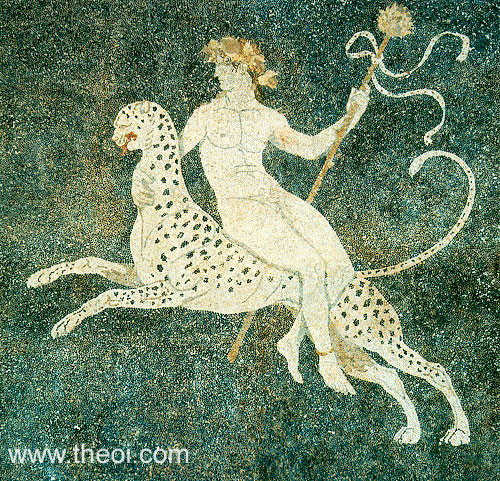
DAPHNE A Naiad-nymph daughter of the river Peneus who was chased by
amorous god Apollo. Just as he was about to catch her she was transformed into a laurel tree. 
DAPHNAIE Dryad-nymphs of the laurel-tree.
DAPHNIS (1) An Oread-nymph prophetess who served as the oracle of Gaea at Delphi before Apollo took over the shrine.
DAPHNIS (2) The hero and demigod of idyllic poetry.
DAULIS A Naiad-nymph who gave her name to the Boeotian town of Daulis.
DEIMUS (Deimos) The god of terror, a companion of the war-god Ares. 
DEINO (1) One of the Graeae--ancient hags who shared one eye and one tooth between them.
DEINO (2) The Naiad-nymph wife of the river Spercheius in northern Greece.
DEIPNEUS The daemon of the making of meals.
DELPHIN (Delphin) A dolphin demigod who helped Poseidon track down the goddess Amphitrite and persuade her to marry to him. As a reward for his service, Poseidon placed him amongst the stars as the constellation Delphinus.
DELPHYNE A serpent-tailed dracaena also known as Echidna.
DEMETER The great Olympian goddess of agriculture and the fertile earth.
Her Mysteries promised mankind passage to a blessed afterlife. 
DERCETIS (Derketis) A Naiad-nymph of Boeotia who was ravished a local shepherd boy.
DESPOENA (Despoine) A mysterious goddess born from Poseidon's rape of the goddess Demeter. Her true name was a secret only revealed to initiates of her cult.
DICAEOSYNE (Dikaiosyne) The personification of equity.
DICTYNNA (Diktynna) The goddess of hunting and fishing nets, also known as Britomarttis.
DIKE The goddess of justice, one of the three Horae (Seasons). 
DIOGENIA (Diogeneia) A Naiad-nymph daughter of the river Cephisus who married an Athenian nobleman.
DIONE (1) The Titan-goddess of the oracle of Dodona in northern Greece who, according to some, was the mother of Aphrodite by Zeus.
DIONE (2) A daughter of the Titan Atlas who was wed to the impious Lydian King Tantalus.
DIONYSUS (Dionysos) The god of wine and festivity, youngest of the
twelve supreme Olympian gods. 
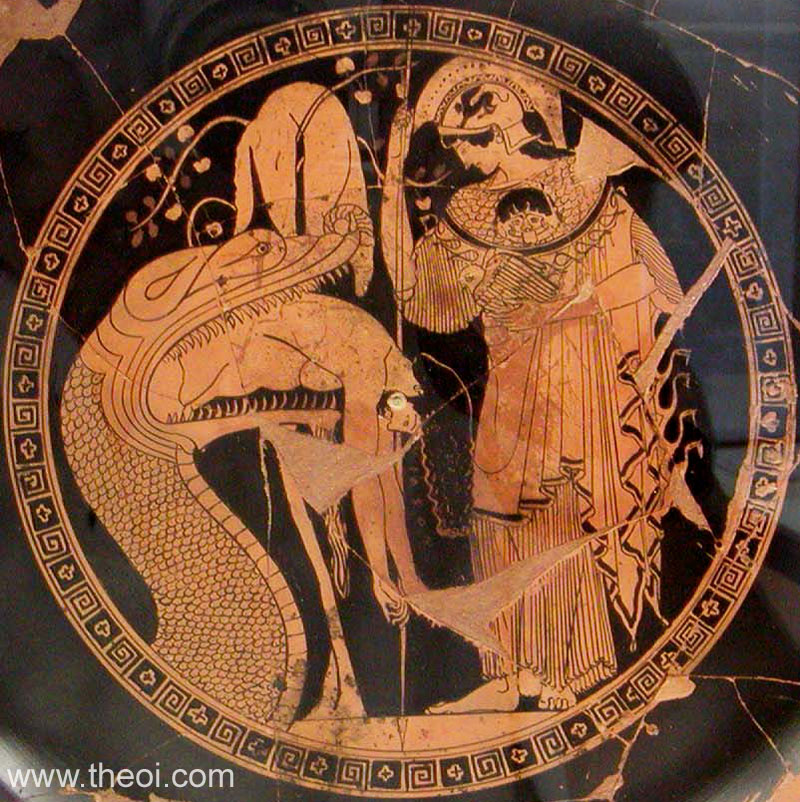
DIOPATRA (Diopatre) A Naiad-nymph of Malis in central Greece. Poseidon transformed her sisters into poplar trees in order to seduced her.
DIOSCURI (Dioskouroi) Twin demigods who came to the aid of sailors in
distress in the guise of Saint Elmo's fire. The pair were set amongst the stars as the constellation Gemini.

DIRCE (Dirke) The Naiad-nymph of a fountain sacred to Dionysus on Mount Cithaeron in southern Boeotia.
DODONA (Dodone) The Oceanid-nymph eponym of the town and shrine of Dodona in Thesprotia.
DODONIDES Prophetic Dryad-nymphs of the sacred oaks of the oracle of Zeus at Dodona.
DOLUS (Dolos) The male personification of trickery and deceit. He was an apprentice of the Titan Prometheus, who manufactured a maiden of lies as an identical twin to Prometheus' lady of truth.
DORIS The Oceanid-goddess of the fresh-water mingled with the brine.
She was the wife of the sea-god Nereus and mother of the fifty Nereides. 
DRACAENAE Drakainai) She-daemons with the upper body of a beautiful woman and the coiling tail of a serpent in place of legs.
DRACAENA OF SCYTHIA (Drakaina Skythia) A monstrous queen of Scythia with the tail of a serpent in place of legs. She stole the cattle of Heracles and demanded the hero mate with her before she would return them.
DRACONES (Drakones) The serpent-dragons of Greek mythology--snake-like monsters with rows of sharp teeth.
DRACON CYCHREIDES (Drakon Kykhreides) A giant dragon-serpent which was driven from the island of Salamis by the hero Cychreus.
DRACON OF COLCHIS (Drakon Kholkidos) A giant, sleepless
dragon-serpent which guarded the Golden Fleece in the sacred grove of Ares at Colchis. It was vanquished by the
hero Jason and and witch Medea. 
DRACON OF THE GIANT-WAR (Drakon Gigantomakhios) A dragon-serpent wielded by a Gigante (Giant) during the war against the gods. Athena tossed it to heaven forming the constellation Draco.
DRACON OF HESPERIA (Drakon Hesperios) A hundred-headed
dragon-serpent set to guard the golden apples of the Hesperides. It was slain by Heracles who was sent to fetch
the apples as one of his Twelve Labours. 
DRACON OF LYDIA (1) (Drakon Maionios) A giant Lydian serpent slain by Heracles in the service of Queen Omphale.
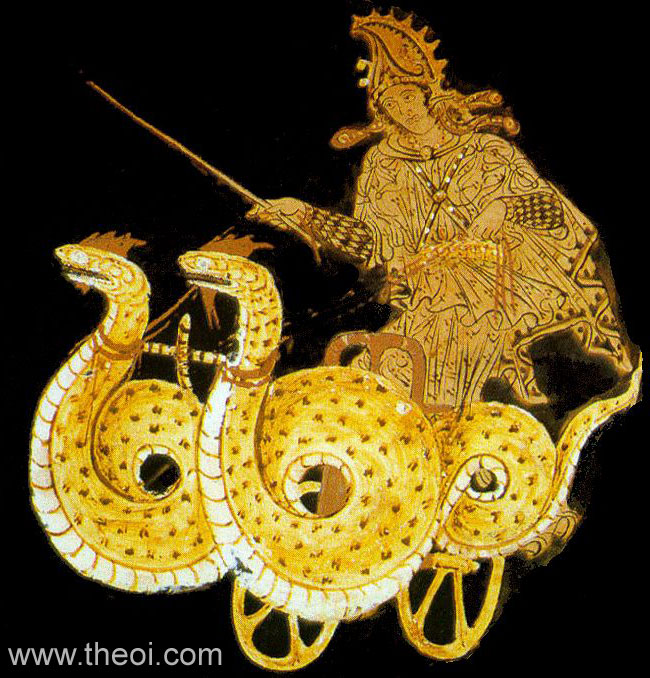
DRACON OF LYDIA (2) (Drakon Maionios) A huge dragon-serpent destroyed by the Lydian giant Damasen. The monster's mate afterwards restored it to life with a magical herb.
DRACON OF NEMEA (Drakon Nemeios) A serpentine dragon which guarded the sacred grove of Zeus in Nemea. It was slain by the warriors of the Seven Against Thebes after the monster killed the infant Opheltes.
DRACON OF THE OPHIOGENES (Drakon Ophiogeneikos) A dragon-serpent set to guard the sacred grove of the goddess Artemis in western Mysia. It impregnated a maiden visiting the shrine who bore it Ophiogenes, ancestor of a tribe of men immune to snake-venom.
DRACON OF PITANE (Drakon Pitanios) A dragon turned to stone by the gods near Pitane in Aeolia.
DRACON OF THEBES (Drakon Ismenios) The dragon-serpent guardian of the
sacred spring of Ares at Thebes. It was slain by the hero Cadmus when he founded the city and sowing its teeth
in the earth he harvested a fully-grown crop of warriors. 
DRACON OF THESPIA (Drakon Thespiakos) A serpentine dragon which ravaged the village of Thespia in Boeotia. The hero Menostratus defeated it by throwing himself into its jaws wearing a suit of spiked armour.
DRACONES OF DEMETER
(Drakones) A pair of winged serpents which drew the flying chariot of Triptolemus, a demigod champion of the
goddess Demeter. 
DRACONES OF MEDEA (Drakones) A pair of winged serpents which drew the
flying chariot of the witch Medea. 
DRACONES OF RHODES (Drakones Rhodioi) A giant, serpentine dragon infesting the island of Rhodes which was destroyed by the hero Phorbas.
DRACONES OF TROY (Drakones Troiades) A pair of giant sea-serpents sent by Poseidon to silence the Trojan priest Laocoon when he was about to warn the Trojans of the ruse of the Wooden Horse.
DRYADS (Dryades) Nymphs of the trees--the Hamadryads were the ladies of
oaks, the Oreads of mountain-pines, and the Meliae of ash-trees. 
DRYOPE A Dryopian princess transformed into a Hamadryad by the nymphs.
DYSAULES A deity of the Eleusinian Mysteries who presided over the ploughing of fields.
DYSIS The eleventh of the twelve Horae, goddesses of the hours, who presided over the hour of sunset.
DYSNOMIA (Dysnomia) The female personification of lawlessness.
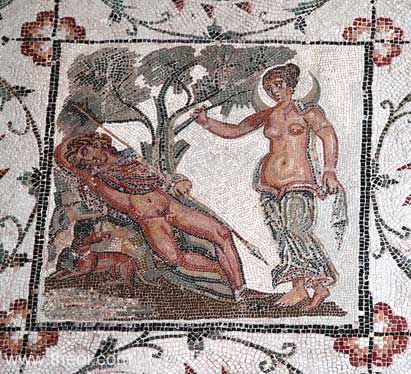
ECECHERIA (Ekekheria) The female personification of truce.
ECHIDNA (1) (Ekhidna) A monstrous dracaena with the upper body of a
beautiful nymph and the tail of a writhing serpent in place of legs. Mating with the hundred-headed giant Typhon
she spawned a brood of terrible monsters. 
ECHIDNA (2) (Ekhidna) An Arcadian she-dragon slain by the hero Argus Panoptes.
ECHIDNADES (Ekhidnades) A serpent-footed ally of the Titans slain by the god Ares in the Titan-War.
ECHO (Ekho) An Oread-nymph handmaiden of Hera who distracted her
mistress with endless chatter. When her goddess caught onto the ruse--for she allowed Zeus to continue his
affairs unhindered--she snatched away her voice leaving behind just an echo. Echo was later spurned by the youth
Narcissus and wasted away until only her voice was left. 
EIDOTHEA (1) A sea-nymph daughter of the seal-herder Proteus who helped Menelaus capture the prophetic old sea-god.
EIDOTHEA (2) A nymph of Mount Othrys in Malis loved by the god Poseidon.
EIDYIA The Oceanid-nymph wife of King Aeetes of Colchis.
EILEITHYIA The goddess of childbirth, a daughter of Zeus and Hera.

EIRENE The goddess of peace, one of the three Horae (Seasons). 
ELAPHOI CHRYSOCERI (Elaphoi Khrysokeroi) Five golden-horned deer
sacred to the goddess Artemis. Four of them drew her chariot while the fifth, known as the Cerynitian Hind,
roamed free. 
ELATREUS One of the metal-working Cyclop-giants.
ELECTRA (1) (Elektra) The Oceanid-nymph of the amber, sun-lit edge of breaking storm-clouds. She was the wife of the wondrous sea-god Thaumas and mother of the rainbow Iris and the storm-gust Harpies.
ELECTRA (2) (Elektra) The Pleiad-nymph mother of Dardanus, ancestor of the kings of Troy, by Zeus.
ELETE The eighth of the twelve Horae, goddesses of the hours, who presided over an hour of mid-afternoon.
ELEUS (Eleos) The female personification of mercy.
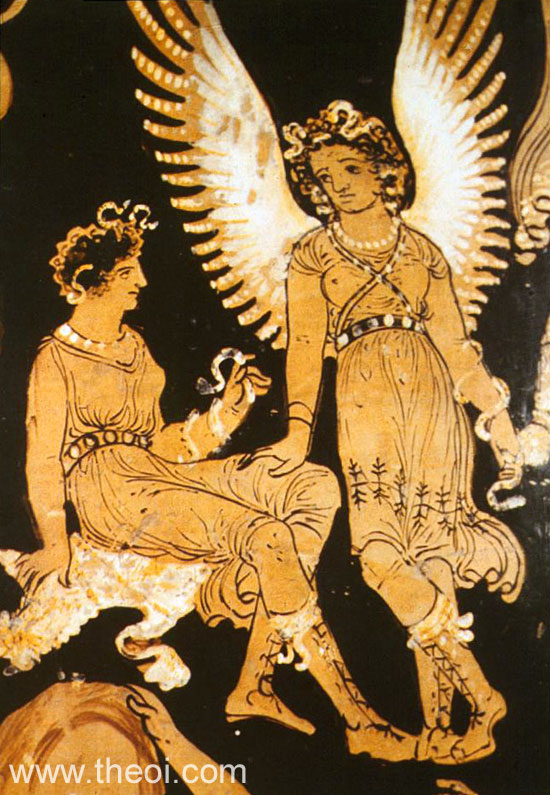
ELEUSIS The eponymous nymph of Eleusis, wife of the town's
first king. She was one of the attendants of Demeter in the Mysteries. 
ELPIS The female personification of hope, the only spirit to remain trapped inside Pandora's box.
ELYSIUM (Elysion) A paradise afterlife realm reserved for the souls of the greatest of the heroes.
EMPUSA (Empousa) A she-daemon with the leg of an ass, a second leg of brass and falming hair which terrorized men in the dark of night.
ENCELADUS (Enkelados) A Gigante crushed by Athena beneath the
island of Sicily during the Giant-War. His restless turnings stirred the fires of volcanic Mount Etna. 
ENDEIS A nymph daughter of the centaur Chiron who, according to some, was the mother of the hero Peleus.
ENDYMION A shepherd-prince loved by the moon-goddess Selene who granted
him immortality in eternal slumber. 
ENYALIUS (Enyalios) A minor daemon of war, one of the sons of Ares.
ENYO (1) The goddess of war, a battlefield companion of Ares.
ENYO (2) One of the Graeae--ancient hags who shared a single eye and single tootch between them.
EOS The winged goddess of the dawn who was cursed by Aphrodite with an
insatiable appetite for men, falling in love with one after another--Cephalus, Tithonus, Phaethon, Orion. 
EOSPHORUS (Eosphoros) The god of the morning-star (the planet Venus)
and herald of the dawn. 
EPHIALTES (1) A Gigante shot in both eyes by the arrows of Apollo and Heracles during the Giant War.
EPHIALTES (2) One of the Aloadae twins, giant sons of the god
Poseidon who tried to storm heaven by piling three mountains one atop the other. 
EPHYRA The eponymous Oceanid-nymph of the town of Ephyra (Corinth) in southern Greece.
EPIALES The underworld daemon of nightmares.
EPIDOTES The daemon (spirit) of the rites of purification who molified the wrath of the Furies. She attended the god Apollo at the shrine of Delphi.
EPIMELIDES Rustic nymphs responsible for the protection of sheep flocks and apple orchards.
EPIMETHEUS The Titan-god of afterthought who foolishly accepted the
first woman, Pandora, and her jar of evils as a gift from the gods. 
EPIONE The goddess of the soothing of pain, wife of the divine physician Asclepius.
EPIPHRON The personification of shrewdness and careful consideration.
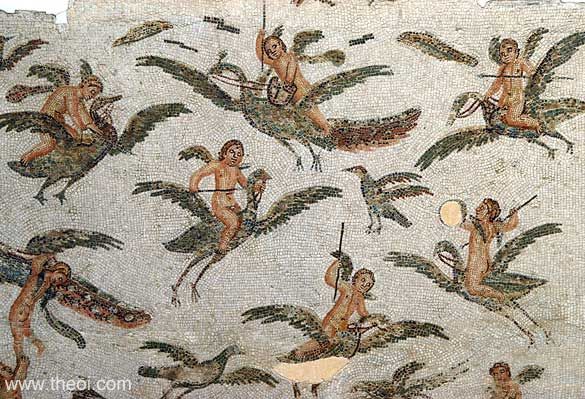
ERASINUS (Erasinos) A river of Argos and its watery god.
ERATO (1) The Muse of love poetry.
ERATO (2) A Dryad-nymph prophetess of Pan who married the Arcadian king Arcas.
EREBUS (Erebos) The primordial deity of darkness, consort of Night, and father of Day and Light.
ERIDANUS (Eridanos) A river of northern Europe or Italy and its god.
ERINYES Three serpent-haired goddesses of vengeance who were born from
the blood of the castrated Heaven (Uranus). 
ERIS The goddess of strife and discord. She set into motion a series of
events which led to the Trojan War by casting a golden apple addresed "to the fairest" amongst the
company of goddesses. 
ERITES The twin personifications of strife--the good Eris represented competitive rivalry while the bad was hateful discord.
EROS (1) The protogenos or primordial deity of sexual desire and procreation. He was one of the first beings to emerge at creation.
EROS (2) The winged god-child of love who pierced the hearts of men with
his love-tipped arrows. 
EROTES The winged child- and infant-gods of loves. The Romans called them
Cupids. 
ERSA (Herse) The goddess of the dew.
ERYMANTHIAN BOAR (Hus Erymanthios) A giant Arcadian boar which
Heracles was sent to fetch as one of his twelve labours. 
ERYTHEIA The Red Isle, a mythical island of the far western streams of the earth-encircling river Oceanus. It was the home of the three-bodied, giant Geryon whose cattle herds were stained red by the light of the setting sun.
EUBOEA (1) (Euboia) A Naiad-nymph daughter of the river Asopus who was abducted by Poseidon to the Greek island of Euboea.
EUBOEA (2) (Euboia) A Naiad-nymph daughter of the river Asterion in Argos who, with sisters Acraea and Prosymna, nursed the infant goddess Hera.
EUBOLUS (Euboulos) The demigod of ploughing, a minor deity of the Eleusinian Mysteries.
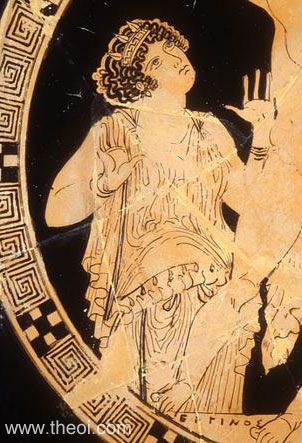
EUCLEIA (Eukleia) The goddess of good repute, a patron of the bride.
EUDAEMONIA (Eudaimonia) The goddess of happiness, prosperity and
opulence. She was one of the younger Charites (Graces), handmaidens of the goddess Aphrodite. 
EUDORA One of the five starry nymphs known as Hyades.
EUNOMIA The goddess of good order, one of the three Horae (Seasons).
EUNOSTOS (Eunostus) The goddess of flour mills.
EUPHEME (1) The spirit of eloquence who was a nurse of the nine Muses and a lover of the goat-legged god Pan
EUPHEME (2) The personification of eloquence, one of the younger Charites (Graces).
EUPHRATES The god of the Assyrian river Euphrates. 
EUPHROSYNE The goddess of mirth and merriment, one of the three
Graces (Charites). 
EUPORIA One of the Horae (Seasons) and goddess of agricultural abundance.
EUPRAXIA The female personification of good conduct.
EUROPA The Oceanid-nymph eponym of the continent of Europe.
EUROTAS A Laconian-rvier god who was the first of the kings of
Sparta. 
EURUS (Euros) The god of the east wind. 
EURYALE One of the immortal Gorgons, a sister of Medusa.
EURYALUS (Euryalos) A one-eyed, metal-working Cyclops giant.
EURYBIA The ancient goddess of power over the sea, wife of the Titan Crius.
EURYMEDON One of the Cabeiri gods.
EURYNOME (1) The Titan-goddess of the water-pastures who was the mother of the Charites (Graces) by Zeus.
EURYNOME (2) A Queen of the Titans, wife of King Ophion. She and her husband were deposed by Cronus and Rhea and cast down from heaven into the Ocean-stream.
EURYNOMUS (Eurynomos) A black-blue skinned daemon of the underworld which devoured the flesh of the dead.
EURYTION (1) A Thessalian centaur who tried to carry off the
bride of king Peirithous on her wedding day, sparking a war between the Lapiths and the centaurs. 
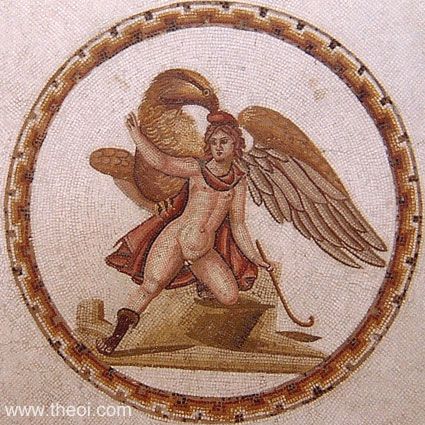
EURYTION (2) A Peloponnesian centaur killed by Heracles when
it forcefully demanded the hand of Olenian princess Mnesimache in marriage. 
EURYTUS (Eurytos) A Gigante slain by Dionysus in the Giant-War.
EUSEBIA The female personification of piety and filial respect. Her husband was Nomus, the spirit of law.
EUTERPE The Muse of lyric poetry. 
EUTHEMIA A nymph of the Greek island of Cos who was struck down by Artemis when she refused to honour the goddess.
EUTHENIA The goddess of prosperity, one of the younger Charites.
EUTYCHIA The spirit of good fortune. 
EVADNE (Euadne) A Naiad-nymph daughter of the river Strymon who married the eponymous king Argos of Argos.
EVENUS (Euenos) A river of Aetolia in western Greece and its watery god.
FATES (Moirai) The three goddesses of fate.
FURIES (Erinyes) The three serpent-haired goddesses of vengeance. 
For Greek names beginning with F see Ph.
GAAEUS (Gaaeus) A fish-tailed marine god who herded the fish of the sea.
GAEA (Gaia) The primordial goddess of the earth, mother of both gods and
men. In the ancient tales of divine succession, she first conspired against husband Uranus, then her son Cronus
and finally Zeus himself. 
GALATEA (Galateia) One of the fifty Nereids who was wooed by the
Cyclops Polyphemus. 
GALENE The Nereid-nymph of calm seas.
GANYMEDES A handsome prince of Troy abducted to Olympus by Zeus to
become the cup-bearer of the gods. 
GEGENEES A tribe of six-armed, Mysian giants slain by the Argonauts.
GELUS (Gelos) The god of laughter.
GERAS The wrinkled, shrunken old daemon of old age. 
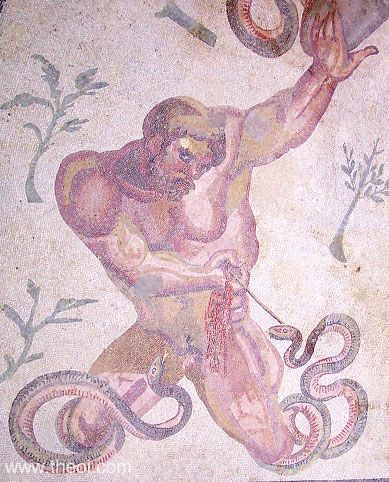
GERYON A giant, three-bodied man who fabulous herd of red,
sunset-stained cattle Heracles was sent to fetch as his tenth labour. 
GIGANTES (1) The giants of myth, which included those who waged war on the gods, as well as the Aloedae, Typhon, Antaeus, Orion, Tityus, the Cyclopes, and the Hecatoncheires.
GIGANTES (2), HECA- (Heka-Gigantes) A hundred giants born of Gaea the
Earth who incited them to wage war on the gods. They were slaughtered in the furious battle which ensued. 
GLAUCIA (Glaukia) A Naiad-nymph daughter of the Trojan river Scamander of Troy who fell in love with a companions of Heracles.
GLAUCUS (Glaukos) A Greek fisherman who was transformed into a fish-tailed sea-god after eating a magical herb.
GORGO A primal Gorgon slain by Zeus who crafted his aegis arm-guard from
its skin. 
GORGONS (Gorgones) Three winged she-monsters with snakes for hair,
wide-staring eyes, broad noses, protruding tusks. lolling tongues, claws of bronze and a gaze which turned man
and beast alike to stone. 
GORGYRA A nymph of the underworld, wife of Acheron, the river of pain.
GRACES (Kharites) The three goddesses of beauty, joy and happiness.

GRAEAE (Graiai) A pair of ancient hags symbolising the white froth of the
sea-foam. They were wrinkled and grey-haired from birth and shared a single eye and tooth. Perseus stole these
to force them to show him the way to the Gorgons. 
GRATION A Gigante slain by Artemis with arrows in the Giant-War.
GRENICUS (Grenikos) A river of Troy and its god.
GRIFFINS (Grypes) A fabulous creature with the foreparts of an eagle
and the rearquarters of a horse. 
GYES One of the three hundred-handed, fifty-headed Hecatoncheir-giants.
GYGE (Gygaie) A lake of Lydia and its deity.
GYMNASTICA (Gymnastika) The fourth of the twelve Horae goddesses of the hours who presided over the morning hour reserved for gymnastics.